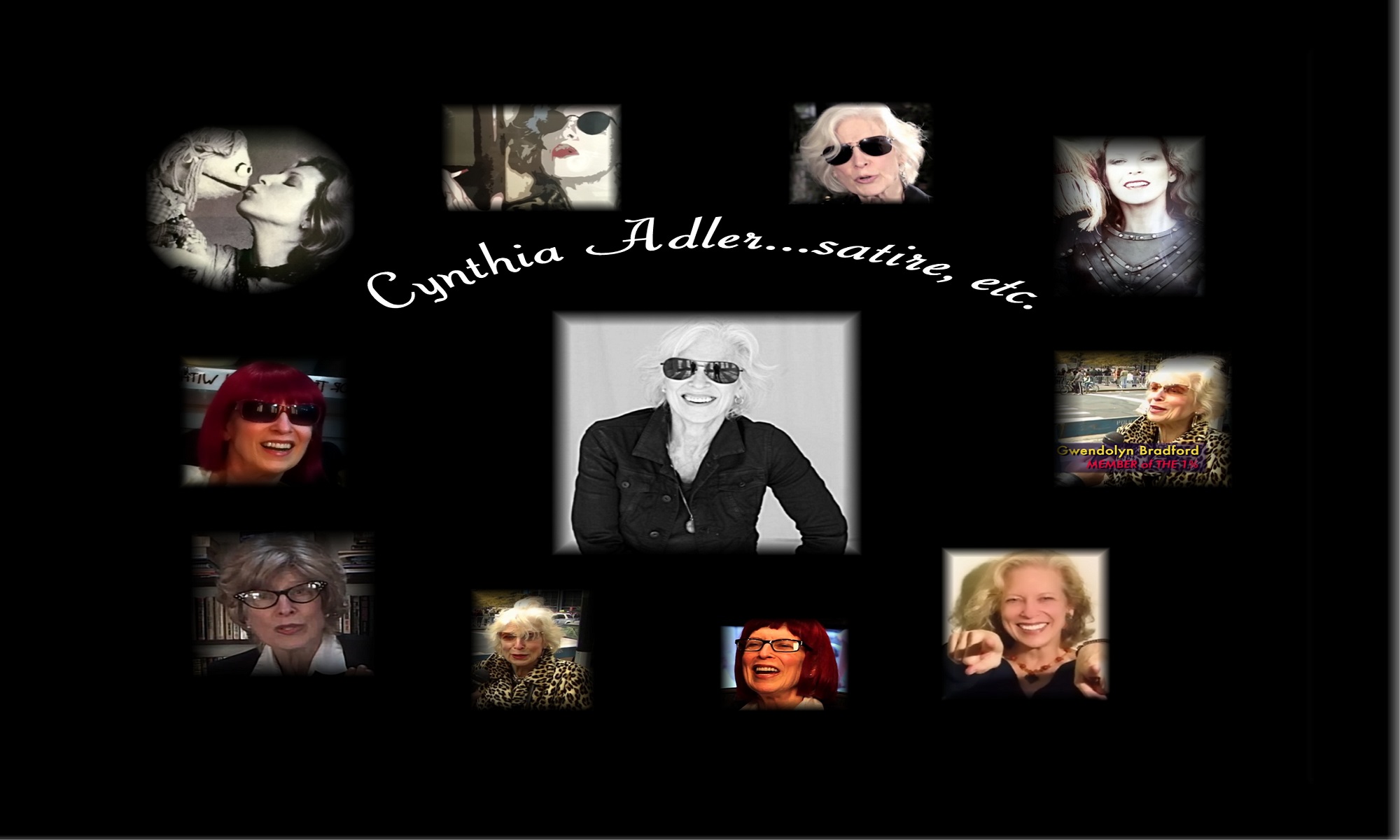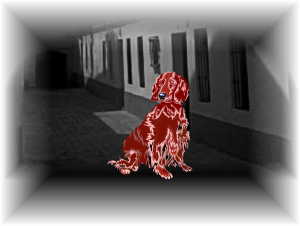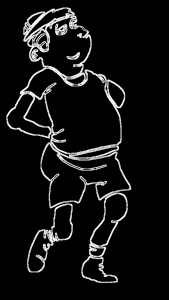Marcie Glober… The Final Cut
Ever since she was a little girl, Marcie Glober wanted to be a hairdresser. She had shorn most of the hair off her Barbie’s before she was three. At first, her Mom chalked it up to baby rage, but Marcie would hug the dolls and sleep with all six of them every night, so her mother figured it probably wasn’t that at all.
At five, while she was doing some cutouts in a magazine, she took the scissors and cut most of the hair off their toy poodle, Smookie. Then she put little hair clips all over what was left of the dog’s blonde coat.
When she was nine, she took a scissor to her best friend Kimmie’s head and cut her braids off and then used her jello from lunch as a hair pomade. Kimmie’s mother wanted to sue, but didn’t get to first base with it, and Kimmie and Marcie still stayed good friends while in school, even though they couldn’t get together anymore for sleepovers.
In Grover Cleveland High School at fifteen, Marcie became fascinated  with hair color. She was failing math and bartered with her friend Kevin, a math whiz, to tutor her in exchange for coloring his hair. She said it would be a surprise, and he would just have to trust her for the color. After two tutoring sessions, Kevin sat quietly with his eyes closed while Marcie applied yellow, red, and purple streaks to his hair. When he opened his eyes, a purple streak of hair covering the front of his eyelid, fell onto his cheek. He just stared for a few minutes and then started crying. He couldn’t even talk, and with the towel that Marcie had put around his shoulders, ran out of the house, leaving his coat behind. Marcie thought he looked great, and luckily, she passed her math test with flying colors. But Kevin never spoke to her again, and refused to take his coat back.
with hair color. She was failing math and bartered with her friend Kevin, a math whiz, to tutor her in exchange for coloring his hair. She said it would be a surprise, and he would just have to trust her for the color. After two tutoring sessions, Kevin sat quietly with his eyes closed while Marcie applied yellow, red, and purple streaks to his hair. When he opened his eyes, a purple streak of hair covering the front of his eyelid, fell onto his cheek. He just stared for a few minutes and then started crying. He couldn’t even talk, and with the towel that Marcie had put around his shoulders, ran out of the house, leaving his coat behind. Marcie thought he looked great, and luckily, she passed her math test with flying colors. But Kevin never spoke to her again, and refused to take his coat back.
Marcie’s teachers thought she would make a wonderful nurse. She was kind and giving, and always ready to help people. She enrolled in the University of Arizona (U of A), because they had one of the best medical centers in the country and she could study nursing while fueling her hairdressing hobby. She figured in a mountain range like that, people had very little interest in haircuts, so that it might be something that she could bring to the table, along with her future nursing skills.
In her first year at U of A, she studied how to give injections, navigate a bed pan, take blood pressure, and find the best vein for blood samples. Often some of the other students played the patients, and when they were pretending they were asleep, she would snip a lock of hair here and there. Very often her small cuts went unnoticed, but when a student realized that they no longer had hair covering their ear, they reported her to the professors, who told her in no uncertain terms that she had a “problem,” and should probably get some help. She was not allowed in the operating room setups for two weeks after that.
Marcie lived in a dorm with nineteen other girls, and many of them were open to haircuts and dye jobs. They had a Golden Retriever named Augie, who was the mascot of the dorm and liked to sleep with the different girls during the night. He would go from one bed to another, giving each one an hour or so, cuddling up close to them, and then leaving for another. When he got to Marcie, she always had a scissors handy. She would take a little off Augie’s head and ears, and after a few days it looked like Augie had a bald spot and he was brought to the vet by the dorm “mother” to check him out.
Marcie had an obsession. An addiction. She needed to cut hair to survive. She knew she had to see someone about this, someone to help her, but she was too embarrassed and too fearful to expose herself. Marcie decided that the only way to deal with this was to stay undercover. To use dolls, wigs and toupees, and all in the privacy of her very own space.
In her junior year at Arizona, Marcie was farmed out to Marshall Clarke Hospital in  Tucson to be a Nurse’s Aide. She worked for a chubby, strident nurse named Georgia Knots. Georgia was quite militant in her attitude towards Marcie. She would command her to get things, make her hold patients buttocks open for longer than needed, shave their privates, and grab hold of their tongues. Marcie found this quite barbaric and when she would let go of a tongue sooner than Georgia found necessary, Georgia would report her to the front desk. Marcie was often reprimanded, but the women at the desk all knew of Georgia’s sadistic tendencies, and in the end they sympathized with Marcie and gave a good report to the school.
Tucson to be a Nurse’s Aide. She worked for a chubby, strident nurse named Georgia Knots. Georgia was quite militant in her attitude towards Marcie. She would command her to get things, make her hold patients buttocks open for longer than needed, shave their privates, and grab hold of their tongues. Marcie found this quite barbaric and when she would let go of a tongue sooner than Georgia found necessary, Georgia would report her to the front desk. Marcie was often reprimanded, but the women at the desk all knew of Georgia’s sadistic tendencies, and in the end they sympathized with Marcie and gave a good report to the school.
Marcie was touched by a lot of what she saw at this hospital. People in constant pain, people healing from operations, people with incurable diseases who were trying to see if certain new procedures would give them more time…and so many others.
Marcie had a wonderful group of friends, who let her give them trims, wildly color a nice chunk of strands, and who would provide more people for Marcie to experiment on, when there was any party at the dorm. Most of her friends had boyfriends…different ones through the years, but they kept up with the dating scene. Not Marcie. She had no interest in men. She was not attracted to women either. She just had very little sexual feeling, and that was true even through her puberty years. But while she was at Marshall Clarke, she encountered a Dr. Dick Bromby. Dr. Bromby was an expert in childhood diseases at the hospital. He was tall, a bit overweight, and was going bald much too soon for his thirty-two years. He was also married. They talked for a long time. Marcie was overwhelmed by his sparkling blue eyes and incredibly warm smile. And for the first time in her life, she felt a twinge of something. Even more than a twinge. She wanted to follow him back to his wing, the Children’s Annex, but Sergeant Georgia would not even let her leave her sight for a minute!
In her Senior year, Marcie applied to the Ketring Hospital in Fargo, North Dakota, to see if she could get a job there after graduation. She picked Fargo, because she loved the television series. She thought she would be needed there in that cold and fairly out of the way place, more than she would be needed in sunny and warm Arizona. Marcie was promptly accepted.
The Ketring Hospital was a noisy and bustling place. So many Fargo people used the hospital to see their doctors and keep up their yearly tests. Marcie got a small but darling apartment right near the hospital, and only steps away from one of the more popular hair salons in Fargo. On her lunch breaks and days off, she would often sit in the salon watching the hair stylists cut and color, her hands twitching and her heart racing. When she would go home at night, she would cut around some of the many inexpensive wigs she bought weekly, styling them in crazy shapes and adding a bizarre mix of color, so that they looked like something Lady Gaga might wear for one of her concerts.
Marcie was a favorite of many of the patients. She took her time, she talked to each and every one of them, and she was interested in hearing about their lives. After a few months in that unit, Marcie decided to make a few visits to the Children’s Unit. She hadn’t been there before, because it reminded her too much of Dr. Bromby back in Arizona, who she still couldn’t get out of her mind.
The Children’s Unit was in a very different part of the building. There were cartoons on the walls and hanging stuffed animals. Marcie felt her heart open. She sat with children who had heart disease, children who had cancer, and children who were on life support.
Sometimes when she would go home at night to work on her wigs, she would mentally place them on the heads of some of the children. Sara Cressel was only eight, but she had lymphoma, and she also found it hard to breathe. She often cried when Marcie was there and told her that she “hurt really a lot, everywhere.” When Marcie got home that night, she looked at her wigs. A small short brown one caught her attention. She took out her dyes and paints and started to put pink streaks onto the strands of hair in the wig. Then she used light green, followed by orange, and then white. When she finished, it looked like something a female circus clown might wear.
The next day, when she went to the Children’s Unit, Sarah was lying down, her head turned away from the other children. Marcie went over to her and sat on her bed. She asked her how she was feeling. Sara didn’t answer. She asked if she would like to play a game. And still nothing. The nurse on call, Carol Leon, told Marcie that Sara hadn’t said a word since dinner the night before, and wouldn’t respond to the other children when they tried to speak to her.
Marcie sat there silently for a while, and then opened her bag, and pulled out the wig that she had dyed so many colors the night before. She reached over and put the wig down in front of Sara. Sara did nothing. Marcie started to touch Sara’s head very gently. She brushed her hair away from her face. Then she went around the bed so that she could face Sara. She took the wig, picked up Sara’s head, and placed the wig on her. Sara didn’t resist. She laid down again, but in a few minutes she slowly rose up. Marcie brought over a mirror from her bag and put it in front of Sara’s face. The other children were silent, but when Sara saw herself in the mirror, she started to laugh. She laughed so hard that all the other children started to laugh as well. Marcie started to well up with tears. Sara was patting her head and then started to walk around to show the other children. Lizzie Stowe, ten years old with a brain tumor said, “Oh, I want one too…can I have one too?” Then some of the other kids started to all call out that they wanted one too. Penny Lyman on life-support, only days from death, said she wanted one too. And Bobby Louter, who had most of his colon removed recently, wanted one too.
Marcie was stunned. She couldn’t even cope with the emotion she was feeling. She realized that the craziness of her colors, her bizarre form of art, finally might mean something more than just an addictive impulse. That maybe there was a reason, way beyond her understanding, for what she was doing all these years. Maybe there was a larger plan in place.
Sara came over to her and sat on her lap and kissed her. “Is this mine?” she asked. “Yes,” said Marcie. “All yours, forever.”
That night, Marcie went home and cut and colored fifteen wigs. The one she made for Bobby Louter was even more outrageous, with silver and gold streaks and a huge heart in burning red dye, in the back of the short fake hair.
Penny Lyman got a long one with crazy bangs that were  painted blue and violet. The rest of the hair was streaked with orange and red, like a beautiful flame. Penny wanted everyone to come over and to see her. She told Marcie that this was “her happiest time ever since she came to the hospital.” Even after Penny died many weeks later, living much longer than was expected, her mother had her buried with the wig on, because she believed that’s what kept Penny alive much longer than anyone thought possible.
painted blue and violet. The rest of the hair was streaked with orange and red, like a beautiful flame. Penny wanted everyone to come over and to see her. She told Marcie that this was “her happiest time ever since she came to the hospital.” Even after Penny died many weeks later, living much longer than was expected, her mother had her buried with the wig on, because she believed that’s what kept Penny alive much longer than anyone thought possible.
Bobby Louter had no more pain. Neither did Sara. One by one, each patient started to experience tiny miracles. Not that they got all better, but their symptoms changed. They didn’t feel the oppression of their sickness, the way they had before.
The word spread. The Director of the Hospital, Dr. Spander, gave Marcie carte blanche to buy wigs and dyes, and as each new child came in, a wig was prepared that would lighten their pain or their fear, and the healings and changes were miraculous.
One day, Marcie got a beautiful note from Dr. Bromby. Her  heart racing, she opened it. It said, “Dear Marcie…I knew that there was something special about you the day that I met you. And I even thought that perhaps you could have assisted me in the Children’s Annex at Marshall. I did put in a request to Georgia Knots, but she said that you preferred to keep working with her. But I am so very thrilled with the wonderful work you are doing, and I hope this idea will branch out to many other hospitals, and help so many more children. Lots of luck to you, Marcie, and please keep me informed of your progress along the way. I’d like some of your wigs for our wing here as well. Sincerely, Dr. Dick Bromby.
heart racing, she opened it. It said, “Dear Marcie…I knew that there was something special about you the day that I met you. And I even thought that perhaps you could have assisted me in the Children’s Annex at Marshall. I did put in a request to Georgia Knots, but she said that you preferred to keep working with her. But I am so very thrilled with the wonderful work you are doing, and I hope this idea will branch out to many other hospitals, and help so many more children. Lots of luck to you, Marcie, and please keep me informed of your progress along the way. I’d like some of your wigs for our wing here as well. Sincerely, Dr. Dick Bromby.
Marcie was breathless. Confused. He wanted to work with her, and Georgia, that witch, never even told her. Never even gave her a choice! But if she did have the choice, would she have done it? Would it have been too much for her, considering the strong and almost uncontrollable feeling she had for him? Marcie suddenly felt a deep rage starting to burn within her. But it didn’t last. “Things probably work out the way they are meant to,” she said out loud, making an effort to finally convince herself of what she really already knew. She remembered that three-year-old girl, cutting the hair off her Barbie’s, and that nine year old, cutting the braids off her best friend, and even that seventeen-year-old, taking some head hairs off a dog that she so loved. And in some deep place inside her, she was truly grateful.
And truthfully, this was enough for Marcie. Yes, she kept Dr. Bromby apprised of everything, all the way. And yes, the “Marcie Glober Wigs”  were reproduced by a huge Wig company and sent to many other hospitals, with Marshall Clarke first on that list.
were reproduced by a huge Wig company and sent to many other hospitals, with Marshall Clarke first on that list.
And yes, Marcie Glober eventually found love.
But that…
is a whole other story.
Cynthia Adler
“Mary Lou Logginberry Spaces Out…and Other Crazy Stories” (Stories for Women…) book excerpt.
Return to Writings


 with hair color. She was failing math and bartered with her friend Kevin, a math whiz, to tutor her in exchange for coloring his hair. She said it would be a surprise, and he would just have to trust her for the color. After two tutoring sessions, Kevin sat quietly with his eyes closed while Marcie applied yellow, red, and purple streaks to his hair. When he opened his eyes, a purple streak of hair covering the front of his eyelid, fell onto his cheek. He just stared for a few minutes and then started crying. He couldn’t even talk, and with the towel that Marcie had put around his shoulders, ran out of the house, leaving his coat behind. Marcie thought he looked great, and luckily, she passed her math test with flying colors. But Kevin never spoke to her again, and refused to take his coat back.
with hair color. She was failing math and bartered with her friend Kevin, a math whiz, to tutor her in exchange for coloring his hair. She said it would be a surprise, and he would just have to trust her for the color. After two tutoring sessions, Kevin sat quietly with his eyes closed while Marcie applied yellow, red, and purple streaks to his hair. When he opened his eyes, a purple streak of hair covering the front of his eyelid, fell onto his cheek. He just stared for a few minutes and then started crying. He couldn’t even talk, and with the towel that Marcie had put around his shoulders, ran out of the house, leaving his coat behind. Marcie thought he looked great, and luckily, she passed her math test with flying colors. But Kevin never spoke to her again, and refused to take his coat back. Tucson to be a Nurse’s Aide. She worked for a chubby, strident nurse named Georgia Knots. Georgia was quite militant in her attitude towards Marcie. She would command her to get things, make her hold patients buttocks open for longer than needed, shave their privates, and grab hold of their tongues. Marcie found this quite barbaric and when she would let go of a tongue sooner than Georgia found necessary, Georgia would report her to the front desk. Marcie was often reprimanded, but the women at the desk all knew of Georgia’s sadistic tendencies, and in the end they sympathized with Marcie and gave a good report to the school.
Tucson to be a Nurse’s Aide. She worked for a chubby, strident nurse named Georgia Knots. Georgia was quite militant in her attitude towards Marcie. She would command her to get things, make her hold patients buttocks open for longer than needed, shave their privates, and grab hold of their tongues. Marcie found this quite barbaric and when she would let go of a tongue sooner than Georgia found necessary, Georgia would report her to the front desk. Marcie was often reprimanded, but the women at the desk all knew of Georgia’s sadistic tendencies, and in the end they sympathized with Marcie and gave a good report to the school. painted blue and violet. The rest of the hair was streaked with orange and red, like a beautiful flame. Penny wanted everyone to come over and to see her. She told Marcie that this was “her happiest time ever since she came to the hospital.” Even after Penny died many weeks later, living much longer than was expected, her mother had her buried with the wig on, because she believed that’s what kept Penny alive much longer than anyone thought possible.
painted blue and violet. The rest of the hair was streaked with orange and red, like a beautiful flame. Penny wanted everyone to come over and to see her. She told Marcie that this was “her happiest time ever since she came to the hospital.” Even after Penny died many weeks later, living much longer than was expected, her mother had her buried with the wig on, because she believed that’s what kept Penny alive much longer than anyone thought possible. heart racing, she opened it. It said, “Dear Marcie…I knew that there was something special about you the day that I met you. And I even thought that perhaps you could have assisted me in the Children’s Annex at Marshall. I did put in a request to Georgia Knots, but she said that you preferred to keep working with her. But I am so very thrilled with the wonderful work you are doing, and I hope this idea will branch out to many other hospitals, and help so many more children. Lots of luck to you, Marcie, and please keep me informed of your progress along the way. I’d like some of your wigs for our wing here as well. Sincerely, Dr. Dick Bromby.
heart racing, she opened it. It said, “Dear Marcie…I knew that there was something special about you the day that I met you. And I even thought that perhaps you could have assisted me in the Children’s Annex at Marshall. I did put in a request to Georgia Knots, but she said that you preferred to keep working with her. But I am so very thrilled with the wonderful work you are doing, and I hope this idea will branch out to many other hospitals, and help so many more children. Lots of luck to you, Marcie, and please keep me informed of your progress along the way. I’d like some of your wigs for our wing here as well. Sincerely, Dr. Dick Bromby. were reproduced by a huge Wig company and sent to many other hospitals, with Marshall Clarke first on that list.
were reproduced by a huge Wig company and sent to many other hospitals, with Marshall Clarke first on that list. Roar to the angels,
Roar to the angels, were the talk of Tulsa. They were long, they were graphic, and they could be brutal. Sure, there were lots of other reviewers that wrote for the other four papers in Tulsa, but no one really cared about any of them anymore after Simon Gusserby hit town. He reviewed a musical called, “What The Cats Dragged In,” written by a local composer, Stephan Schneer and lyricist, Blanka Donka. Gusserby called the play “A cat box of turds,” and called the music “atonal” and the book, “a pitiful and boring disaster.” It closed in two nights, and Blanka Donka moved to Wisconsin the next week to study marketing.
were the talk of Tulsa. They were long, they were graphic, and they could be brutal. Sure, there were lots of other reviewers that wrote for the other four papers in Tulsa, but no one really cared about any of them anymore after Simon Gusserby hit town. He reviewed a musical called, “What The Cats Dragged In,” written by a local composer, Stephan Schneer and lyricist, Blanka Donka. Gusserby called the play “A cat box of turds,” and called the music “atonal” and the book, “a pitiful and boring disaster.” It closed in two nights, and Blanka Donka moved to Wisconsin the next week to study marketing. review. Many people cancelled their tickets, and the show lasted only three weeks of what should have been a three-month run.
review. Many people cancelled their tickets, and the show lasted only three weeks of what should have been a three-month run. The audience took their seats, and were riveted for that entire hour and a half. Gusserby sat there thinking about what kind of vicious review he could give Kathy. He badly needed to go to the bathroom, but knew he couldn’t get up during the play to do that. At the end of the play, the audience was on it’s feet clapping for the longest time. Simon Gusserby was bored. He sat until the curtain came down and then started to get up to make a beeline for the Men’s Room. But he couldn’t move. He couldn’t even lift himself off the chair. He called for an usher. Two young men, (understudies) came over to Simon. “We can’t get you out, sir,” said one. “I think we have to cut you out. You seem to be glued to the seat!” Simon was apoplectic and starting to drip a little. One of the boys, couldn’t contain himself and started to laugh. What was left of the crowd, wasn’t moving. They were fixated on Simon. The theatre manager arrived with a big scissor. Simon tried to get him to stop, but he started to cut around Simon’s pants until he had made a hole big enough for Simon to stand up, exposing his buttocks completely. Many phones were taking videos by this time, and Simon couldn’t hold on any more. As he ran to the Men’s Room with his butt exposed, he left a yellow trail of urine.
The audience took their seats, and were riveted for that entire hour and a half. Gusserby sat there thinking about what kind of vicious review he could give Kathy. He badly needed to go to the bathroom, but knew he couldn’t get up during the play to do that. At the end of the play, the audience was on it’s feet clapping for the longest time. Simon Gusserby was bored. He sat until the curtain came down and then started to get up to make a beeline for the Men’s Room. But he couldn’t move. He couldn’t even lift himself off the chair. He called for an usher. Two young men, (understudies) came over to Simon. “We can’t get you out, sir,” said one. “I think we have to cut you out. You seem to be glued to the seat!” Simon was apoplectic and starting to drip a little. One of the boys, couldn’t contain himself and started to laugh. What was left of the crowd, wasn’t moving. They were fixated on Simon. The theatre manager arrived with a big scissor. Simon tried to get him to stop, but he started to cut around Simon’s pants until he had made a hole big enough for Simon to stand up, exposing his buttocks completely. Many phones were taking videos by this time, and Simon couldn’t hold on any more. As he ran to the Men’s Room with his butt exposed, he left a yellow trail of urine. Poodle. He was a reddish tan color and had the saddest eyes Beryl had ever seen. He had been found wandering all over the streets alone by a family who were visiting the area…no collar, and no tags, so they brought him to the Vet and left him there. Actually, Dr. Polly Fraybush, the Vet on duty, gave him the name Mr. Floppy, because he was a long-haired dog with big floppy ears and a sad sack personality.
Poodle. He was a reddish tan color and had the saddest eyes Beryl had ever seen. He had been found wandering all over the streets alone by a family who were visiting the area…no collar, and no tags, so they brought him to the Vet and left him there. Actually, Dr. Polly Fraybush, the Vet on duty, gave him the name Mr. Floppy, because he was a long-haired dog with big floppy ears and a sad sack personality. agitated cat came with it’s owner into the Vet, she managed to pull free from her master’s hands as Beryl came in with Mr. Floppy. The cat immediately ran to the dog and started scratching and hissing and clawing at his face. Beryl quickly managed to pull the wild cat off her dog, but he suffered cuts and some of his hair was torn out. Beryl started to cry, and brought him quickly into Dr. Polly, who tended to him, and gave him lots of treats. But Beryl couldn’t work that day. She took him home, bathed him, dried him off, and hugged him to her, even as she fell asleep.
agitated cat came with it’s owner into the Vet, she managed to pull free from her master’s hands as Beryl came in with Mr. Floppy. The cat immediately ran to the dog and started scratching and hissing and clawing at his face. Beryl quickly managed to pull the wild cat off her dog, but he suffered cuts and some of his hair was torn out. Beryl started to cry, and brought him quickly into Dr. Polly, who tended to him, and gave him lots of treats. But Beryl couldn’t work that day. She took him home, bathed him, dried him off, and hugged him to her, even as she fell asleep.
 Play your music you pied pipers
Play your music you pied pipers
